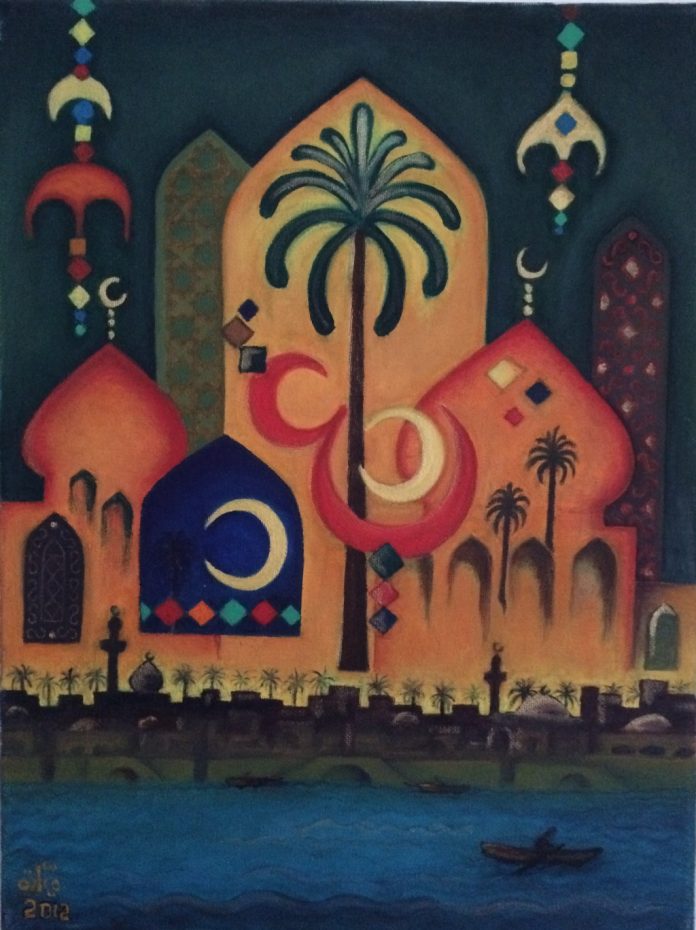The art of Iraq: ‘Baghdad,’ a painting by Northeast resident Mayyadah Alhumssi, be on display during Iraqi Cultural Day on March 8.
There are several hundred Iraqis living in Northeast Philadelphia, and their culture and their history will be the subjects of a daylong program at the Penn Museum, 3260 South St., on March 8.
Iraqi Cultural Day will feature glimpses at the country’s ancient artifacts and include a reading of the modern children’s book, The Librarian of Basra.
Fadya Hamzah, one of about 700 Iraqis who live in Philadelphia, will translate the book into Arabic as it is read, she said during a Feb. 26 phone interview.
Hamzah said most of the Iraqis who live in the Northeast reside in the 19111 or 19149 ZIP codes. Almost all, if not all, are refugees. Most have been here for only about five or six years, but some came after the Gulf War in the early 1990s. Many are from Basra, she said.
“I am one of them,” she added.
There were many reasons for leaving their homeland, she said. “We don’t like the government; it’s not safe; there are many, many reasons,” she said.
Many of Philadelphia’s Iraqis are educated and have degrees, she said.
Some, however, don’t speak English. Hamzah is an interpreter who works for Lutheran Family and Children Services, she said.
Author Jeanette Winter’s The Librarian of Basra is a story about Alia Muhammad Baker, the librarian in the southern Iraqi city, who wanted to save more than 30,000 books that were in danger of being destroyed during the Iraq War as the city was being attacked by British and Australian troops. Baker had known the city was sure to be attacked and asked her government to permit moving the library’s books. She was refused and so began smuggling them out. She was successful in getting most of the books out of the library before it was destroyed.
“It is a true story, and a little bit sad,” Hamzah said.
The book’s reading and Hamzah’s Arabic translation are being done in conjunction with the Free Library’s and mayor’s office’s “One Book, One Philadelphia” project. The project was founded in 2003 with the aim of motivating residents to read a featured selection and participate in discussions, events, workshops and classes, said Penn Museum spokeswoman Jemmell’z Washington.
All Free Library branches have several copies of The Yellow Birds as well as its companion books, Children of War: Voices of Iraqi Refugees, for middle-grade children, and The Librarian of Basra, which is for younger children.
The museum’s program begins at 1 p.m. with a display of some of the museum’s 30,000 clay tablets inscribed in languages of ancient Iraq, Sumerian and Akkadian. The tablets are everything from school notes to literary compositions to merchants’ receipts and were written in clay from 2900 B.C. to 500 B.C.
At 1:30 p.m., guests can learn about Iraqi cuisine, followed by a discussion of efforts to preserve Iraq’s cultural past, as well as a talk about the discovery of a 4,500-year-old royal cemetery. The group reading of The Librarian of Basra starts are 3:15 p.m.
Throughout the day, guests can meet painter Mayyadah Alhumssi and other artists, view photographic works, dress in Iraqi attire and learn to write in Arabic.
Alhumssi came to the United States from Baghdad a year ago and lives in the Northeast. Her “Baghdad,” is one of her paintings that will be on display March 8. It’s based on 1,001 Arabian nights, she said. She said she brought some paintings with her when she came to America, but she’s producing more now.
“I’m painting every day for the event,” she said. ••
For information and tickets, visit www.penn.museum.





